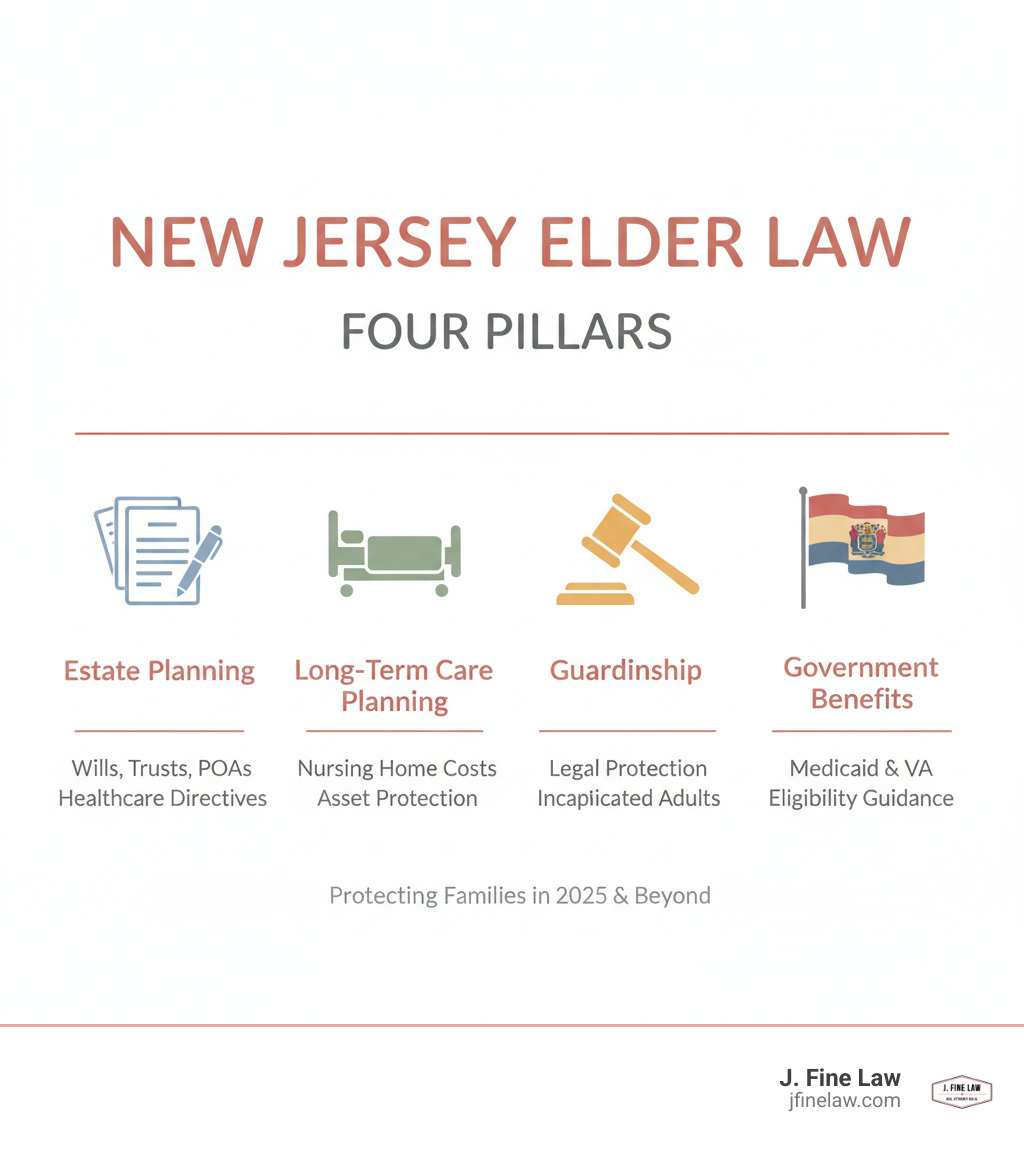New Jersey Elder Law: Crucial 2025 Guide
Why New Jersey Elder Law Matters More Than You Think
New Jersey elder law is a specialized legal practice focused on the unique needs of aging individuals and their families. It covers estate planning, long-term care, Medicaid, guardianship, and asset protection. With fewer than 60 Certified Elder Law Attorneys among over 85,650 licensed attorneys in New Jersey, finding the right guidance is critical.
Unlike traditional estate planning, which focuses on distributing assets after death, elder law takes a “life care” approach. It’s a senior adult aging resource that addresses immediate and future needs, helping to protect assets from staggering long-term care costs and ensuring access to quality care.
Quick Answer: What New Jersey Elder Law Covers
- Essential Planning – Wills, trusts, powers of attorney, and healthcare directives.
- Long-Term Care – Preparing for nursing home costs averaging over $11,000/month in NJ.
- Benefit Navigation – Medicaid eligibility, asset protection, and Veterans benefits.
- Incapacity & Guardianship – Legal protection for adults who can no longer manage their affairs.
Why is planning ahead so important?
Many families wait until a crisis hits—a sudden fall, a dementia diagnosis, or a hospital discharge with no plan. This reactive approach is stressful, expensive, and limits your options. Proactive planning is essential for several key reasons.
First, it helps avoid financial devastation. The average nursing home in New Jersey costs over $11,000 per month. Without a plan, a lifetime of savings can be wiped out in a matter of months. Early planning allows for legal strategies to protect your assets for a surviving spouse or your heirs.
Second, it provides a roadmap for navigating complex healthcare and benefits systems. New Jersey’s Medicaid rules, for instance, are notoriously strict, with a 60-month “look-back” period for asset transfers that can lead to costly penalties if handled incorrectly.
Finally, planning ahead protects your loved ones from making agonizing decisions under pressure and ensures you maintain control. Documents like Powers of Attorney and Advance Directives let you appoint trusted individuals to manage your affairs and make healthcare choices according to your wishes. Without them, your family may face a lengthy and public court process to get the authority to help you.
I’m Jason Fine, a trial attorney with over 25 years of experience helping families with complex legal challenges, including New Jersey elder law matters involving nursing home abuse and neglect. I’ve seen how proper legal planning protects families from financial ruin and ensures seniors receive the dignity and care they deserve.
The Core Components of New Jersey Elder Law
New Jersey elder law is about building a comprehensive safety net to ensure your wishes are honored, your assets are protected, and you receive quality care. It provides a defense against the uncertainties that come with aging. Let’s walk through the essential components of a solid elder law plan.
Planning for Your Assets and Healthcare Wishes
The most empowering thing you can do is make your own choices while you still can. This means putting legal documents in place that speak for you when you can’t.
- Advance Directives for Health Care are legal documents that state your medical treatment wishes. In New Jersey, this includes a Proxy Directive (or Health Care Proxy) to name your decision-maker and an Instruction Directive (or Living Will) to outline your preferences on life-sustaining treatment. You can find official forms and information through Legal Services of New Jersey.
- A Durable Power of Attorney (POA) is critical for financial matters. It lets you appoint a trusted agent to manage your finances if you become incapacitated. Without one, your family may need to pursue a costly guardianship proceeding just to pay your bills.
- Wills and Trusts are used to manage and distribute your assets. A Will directs how your property is distributed after death but must go through the public court process of probate. A Trust can avoid probate, offering more privacy and control. Certain irrevocable trusts are also powerful tools for protecting assets from nursing home costs and preserving Medicaid eligibility.
These documents form the backbone of your plan, giving you and your family peace of mind.
Navigating Long-Term Care and Medicaid
Long-term care costs in New Jersey are staggering, with nursing home care exceeding $11,000 per month. Strategic planning is essential to avoid depleting your life savings.
Medicaid planning is often a key part of this strategy. Medicaid provides long-term care coverage for those with limited income and assets, but qualifying in New Jersey is difficult. The state imposes strict asset and income tests; a single person generally cannot have more than $2,000 in countable assets.
The biggest hurdle for many is the 5-year look-back period. Medicaid reviews all financial transactions for the 60 months before you apply. Any gifts or transfers made for less than fair market value can trigger a penalty period, leaving you ineligible for benefits for months or even years. This is why early planning is so valuable, as it allows you to legally restructure assets outside of that five-year window.
Navigating these rules, spousal protection provisions, and potential estate recovery actions by the state requires expert guidance. An experienced New Jersey elder law attorney can help you understand the legal strategies for asset protection and guide you through the complex application process.
Guardianship and Special Benefits in New Jersey
Sometimes, a person loses the ability to make decisions without having planning documents in place. In these cases, guardianship may be necessary. This is a court process where a judge appoints a guardian to manage the personal and financial affairs of an incapacitated person. It is a last resort, as it removes an individual’s legal rights, but it is sometimes the only way to protect a vulnerable adult from harm or exploitation. A properly executed Power of Attorney and Health Care Proxy can prevent the need for guardianship.
For those who served our country, Veterans’ benefits like the Aid and Attendance program can provide crucial financial support for long-term care. This pension is for eligible veterans and surviving spouses who need help with daily living activities. An attorney can help evaluate eligibility and assist with the application.
Special needs planning is another critical area, allowing parents to provide for a child with disabilities without disqualifying them from essential government benefits like SSI and Medicaid. A Special Needs Trust can hold an inheritance to improve the child’s quality of life while preserving their eligibility for public assistance.
Finding and Working with an NJ Elder Law Attorney
When facing decisions about your future health and financial security, you need a partner who combines legal expertise with genuine compassion. Finding the right New Jersey elder law attorney can make all the difference.
The Value of a Qualified Elder Law Attorney
You wouldn’t see a general practitioner for heart surgery, and the same principle applies to elder law. This is a highly specialized field requiring deep, current knowledge of the constantly changing federal and state regulations affecting seniors.
Experience with New Jersey cases is crucial. Our state has its own unique legal framework for Medicaid, guardianship, and senior protections. An attorney who regularly works with New Jersey’s state and county agencies understands the local nuances that can make or break a case.
When evaluating attorneys, look for credentials. The Certified Elder Law Attorney (CELA) designation from the National Elder Law Foundation is the gold standard, held by fewer than 60 of New Jersey’s 85,650+ attorneys. Membership in organizations like the National Academy of Elder Law Attorneys (NAELA) also shows a commitment to staying on the cutting edge of the field. You can find other helpful state resources at the NJ Office of the Ombudsman for the Institutionalized Elderly.
What to Expect: Fees, Resources, and Protecting Your Rights
Most elder law firms offer flat fees for services like drafting wills, trusts, or handling Medicaid applications. This provides upfront clarity on cost. For more complex matters like litigation, attorneys may charge hourly rates. Many firms, including ours, offer free initial consultations to discuss your situation and help you understand your options without financial commitment.
Beyond your attorney, New Jersey offers valuable resources. Your County Office on Aging can connect you with local support services, and organizations like Legal Services of New Jersey offer free legal assistance for low-income seniors.
Unfortunately, elder abuse and neglect are serious threats. New Jersey elder law provides strong protections against financial exploitation, physical abuse, and neglect. If you suspect a loved one is being harmed in a care facility or at home, it is critical to act quickly.
At J. Fine Law, protecting vulnerable individuals is at the heart of what we do. We have built our reputation on aggressive advocacy for those harmed by negligence, including seniors suffering from nursing home abuse. With a 98% success rate and over $50 million recovered for our clients, we know how to fight for justice. We pride ourselves on rapid attorney response because when a loved one is in danger, every moment counts. If you suspect nursing home abuse in New Jersey, we are here to help you understand your rights and take action. Learn more about what to do if you suspect nursing home abuse in New Jersey.
The right attorney is your advocate and guide. Don’t wait for a crisis. Let’s work together now to create a plan that brings you peace of mind.



